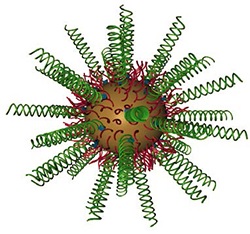 |
| Spherical nucleic acid used to deliver RNA to the brain--Courtesy of Northwestern |
Researchers at Northwestern University have put together a nanostructure capable of shuttling a new RNA molecule across the blood-brain barrier to reach tumor cells in mice with glioblastoma multiforme, a particularly aggressive form of brain cancer.
The newly discovered miR-182 RNA molecule has shown potential in the suppression of genes in the brain that cause cancer. But getting past the blood-brain barrier has always been a challenge, so delivery of the molecule is especially important for the RNA's success. In fact, the delivery challenges are two-fold, because RNA itself is a troubling prospect because of its resistance to transport in vivo.
But using spherical nucleic acids, the scientists were able to safely deliver miR-182 to the brain to target multiple oncogenes in one go, killing cancer cells and reducing its growth potential.
"We demonstrate a more specific, more personalized approach to therapy," lead researcher Alexander Stegh said in a statement. "SNAs are a very promising platform to silence the particular genes that drive or contribute to cancer progression in individual patients."
The delivery particles demonstrate a disguise property that allows them to pass through the challenging blood-brain barrier without toxicity or immune response.
"We designed a novel delivery method for miR-182 using (spherical nucleic acids)," Stegh said. "Small gold nanoparticles are conjugated with miR-182 sequences. They cross the blood-brain/blood-tumor barrier, and accumulate within brain tumor sites, where they target oncogenes, regulate cell growth and differentiation, reduce tumor burden and prolong survival in our mouse models."
- here's the Northwestern report